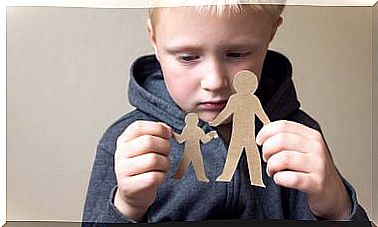Fear Of Child Failure

The fear of failure easily leads to the child not being able to reach his or her full potential. This can cause him anxiety, and he may feel weak, vulnerable, unmotivated, and incapable of wanting to work.
The idea of failure causes fear in many adults as well. There may be social reasons behind this, but often also the fact that a person has received an education where making mistakes is punished and where mistakes are given negative side meanings. If failure is followed by ridicule, contempt, or rejection, it can be difficult to seize new opportunities. This affects the child’s development and the use of everyday opportunities.
Fear of child failure
Characteristics of a child who is afraid of failure
- Stress
- Anxiety
- Dejection
- Isolation
- Low self-esteem
- Poor tolerance of criticism (also constructive)
- Insufficient defenses as the immune system weakens
- Fear of expressing oneself, thoughts and feelings
The fear of a child’s failure is often easy to identify. The child is usually afraid of being condemned or rejected for everything they do, becomes very cautious, and may begin to shy away from other people. He may feel insecure and anxious about performing certain tasks for fear of making mistakes.

If the family is punished for making mistakes, the child can become fearful, which gradually leads to distrust of the parents. This can seriously damage the relationship between the child and the parents. The fear of failure prevents the child from taking risks and exploring the world for himself, leaving him apart from many experiences.
What causes a child to fear failure?
- The pursuit of perfection
- Lack of attention
- Parental projection
- Physical or mental abuse, including, for example, making fun of
When parents put too much pressure on a child to expect perfection in everything the child does, they thus create a distorted picture of reality for the child. In this way, they prevent the child from developing in a healthy way mentally and emotionally.
Unfortunately, the media also reinforces the fear of failure for the child and everyone else. The media spreads to us thoughts that a failed person is seen in a bad light, he or she is not valuable, he or she has no social relationships, he or she has no talents or is incapable, and in short, he or she is unsuccessful in life. Prohibiting errors is closely related to this topic. The image of a successful or talented person is reinforced with material and short-term happiness in advertising and marketing.
Methods for overcoming the fear of failure
Failure is not the end of the world. Failures and making mistakes offer an opportunity to grow, expand analytical capacity, learn, correct behavior, and move forward stronger and wiser. It is very important that the child also knows this.
The child needs to be taught to overcome the fear of failure. The child should also know that he or she is receiving the affection, advice and support of his or her parents. Therefore, our parents should strengthen the child’s abilities, guide him or her, provide the child with security, respect, and understanding. The child should also be constantly reminded that failures can be overcome and are not always unpleasant experiences. In many cases, failures also have a fun side.
Parents can show the child what he or she can change and help the child with things he or she cannot change for himself or herself. In this way, it is easier for the child to understand that the stamp of the “failure” will not define the person for the rest of his life.

How can parents help their child?
- Appreciate the child’s effort. For example, even if a child doesn’t get the best grade from an exam, but he or she tried his or her best, you should appreciate the effort the child sees and motivate him or her to try again next time.
- Goals should be appropriate and realistic for the child. It is important to educate the child and encourage him or her to set himself or herself sensible and achievable goals that are achievable and measurable by the child. This would be the best way for the child to later appreciate the work he or she did to achieve his or her goals.
- Consistency is important. We should guide and encourage our child’s perseverance so that the child does not give up on doing tasks or goals as soon as he or she has made a mistake or failed. It is important to be realistic, but it is also important to require effort, as it can result in great results as well as valuable experiences.
- Parents should set an example for their child. The influence of parents is of great importance. As parents, we are our child’s role model and an example that our child follows. This is especially true during the first years of a child. It is impossible to teach a child, or it is even more difficult to demand things from him, if we do not serve as an example to him of the things we want or the results we expect. So don’t push your child into fear of failure.
- Overprotection of the child should be avoided. In order for parents to prevent instilling in the child the fear of failure, they should also not avoid problems or difficulties, or do everything for the child. It is more beneficial to raise a child autonomously so that the child learns to take care of himself.
- Parents should also not be too permissive. Children of all ages need guidance, role models, and examples to help a child learn to perform even the most challenging tasks. And the best role models and guides for the child are his or her own parents. So do not let the child learn everything outside the home, but raising the child should become the number one priority of the parents.









